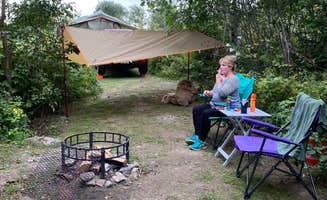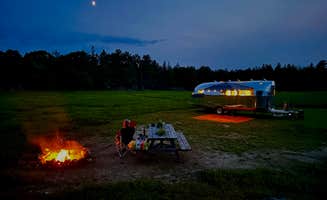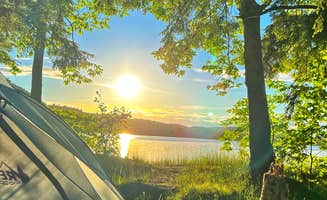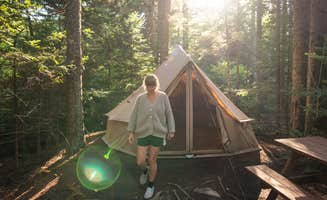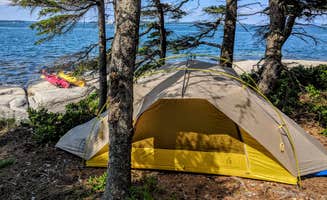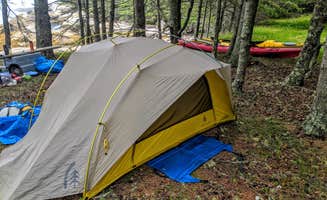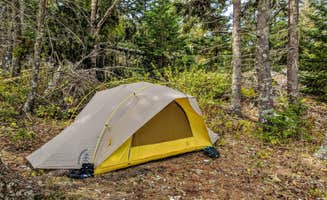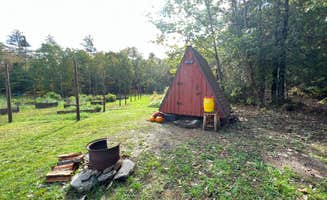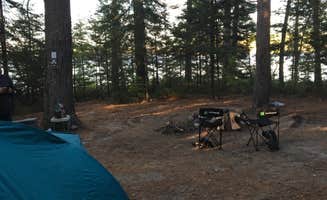Tent camping near Surry, Maine offers remote island experiences and woodland retreats along Maine's rocky coastline where tides can vary by 9-14 feet daily. The region features multiple public land areas with primitive camping amid granite outcroppings and blueberry fields. Camping options range from free first-come, first-served sites to small privately maintained campgrounds with basic amenities.
What to do
Paddle to island campsites: The Deer Isle Archipelago contains numerous islands accessible only by boat, perfect for adventurous campers seeking solitude. A camper at Nathan Island explained, "This island is perfect for 1-2 small tents and is just a stone's throw away from the famous and beautiful Isle au Haut (part of Acadia National Park). We stayed 2 nights on Nathan and paddled to Duck Harbor for some day hiking on Isle au Haut."
Hike mountain trails: Several campgrounds offer access to moderate hiking trails with ocean views. A visitor to Donnell Pond Public Reserved Land shared, "This was really a beautiful spot to set up camp... The hike the next morning was a good climb for only about a 3+ mile hike." These trails are typically less crowded than those at nearby Acadia National Park.
Swim in freshwater ponds: Many campsites are located near ponds suitable for swimming during summer months. A camper who stayed at Donnell Pond noted, "We boated to the beach with our gear and camped there. This lake is huge so keep that in mind. We parked at the public dock that has public parking and boated over to the beach... We were able to swim here as well."
What campers like
Privacy between sites: Despite close proximity on some islands, many campgrounds offer good separation between sites. A visitor to Maine Wild Blueberry Bliss reported, "The land was quiet and peaceful - it is acres of blueberry fields, which create a special sense of being in nature. The site we were at had a nice tree, which framed the site... The area was very quiet - at night we only heard the crickets and the wind."
Seasonal berry picking: Campers enjoy harvesting wild blueberries during late July and August at several locations. A camper at Continuous Harmony Farm mentioned, "Chill out and watch the sheep, or pick your own blueberries alongside their raking crew in their organic wild blueberry barrens. This experience is available only during blueberry season in late July and early August."
Stargazing opportunities: Limited light pollution makes this area excellent for night sky viewing. A camper at Saddleback Island described it as "the perfect place to make dinner, watch the sunrise or set, and star gaze with no city lights or trees to obstruct your view."
What you should know
Reservations and accessibility: Many island campsites are first-come, first-served with no reservation systems. A camper at Saddleback Island advised, "Since all of the islands are first-come, first-served, have a back-up plan for camping on another island." The few sites that do accept reservations fill quickly.
Weather considerations: Fog can develop rapidly in coastal areas, creating navigation challenges. A reviewer cautioned, "The fog can roll in at any minute so come prepared with a chart, compass, bearings between islands/markers and a marine radio."
Waste disposal requirements: Most primitive sites require carrying out all waste. As one camper noted about island camping, "You are required to use Wag Bags instead of digging a cat hole to dispose of human waste." Many campgrounds lack trash receptacles, requiring campers to pack out all garbage.
Tips for camping with families
Choose accessible sites: Some camping areas require significant hiking or boating, making them challenging for families with young children. A camper at Duck Harbor Campground explained, "You need to bring everything with you (except water) on the mailboat and then walk on a short distance to one of 5 campsites."
Look for spacious campsites: Some private campgrounds offer more room for families. A visitor to Four Acre Woods Campground cautioned, "The sites are small and close together. I was there when it was still cold and was the only person so it didn't bother me."
Prepare for minimal amenities: Most sites lack running water and modern restrooms. A camper at Rough and Raw described it as "A safe and lovely primitive site," emphasizing the basic nature of facilities in the area.
Tips from RVers
Limited hookup options: Few campgrounds in this area accommodate larger RVs or provide full hookups. A reviewer at Maine Wild Blueberry Bliss noted, "This is dry camping, with no hookups, and generators are not allowed... There was one other camper at site 1, and we could also see the owners house, but both were far enough away that we had a great sense of privacy."
Look for level parking: Many primitive sites have uneven terrain challenging for RVs. One camper mentioned, "We stayed in campsite 2, where the land is open and flat, and there was plenty of room for our rv."
Consider boondocking capacity: With limited water and electric hookups, RVers need sufficient off-grid capacity. One camper at Maine Wild Blueberry Bliss shared, "There was a shared porta potty available for use for all of the campsites," highlighting the minimal facilities available.


